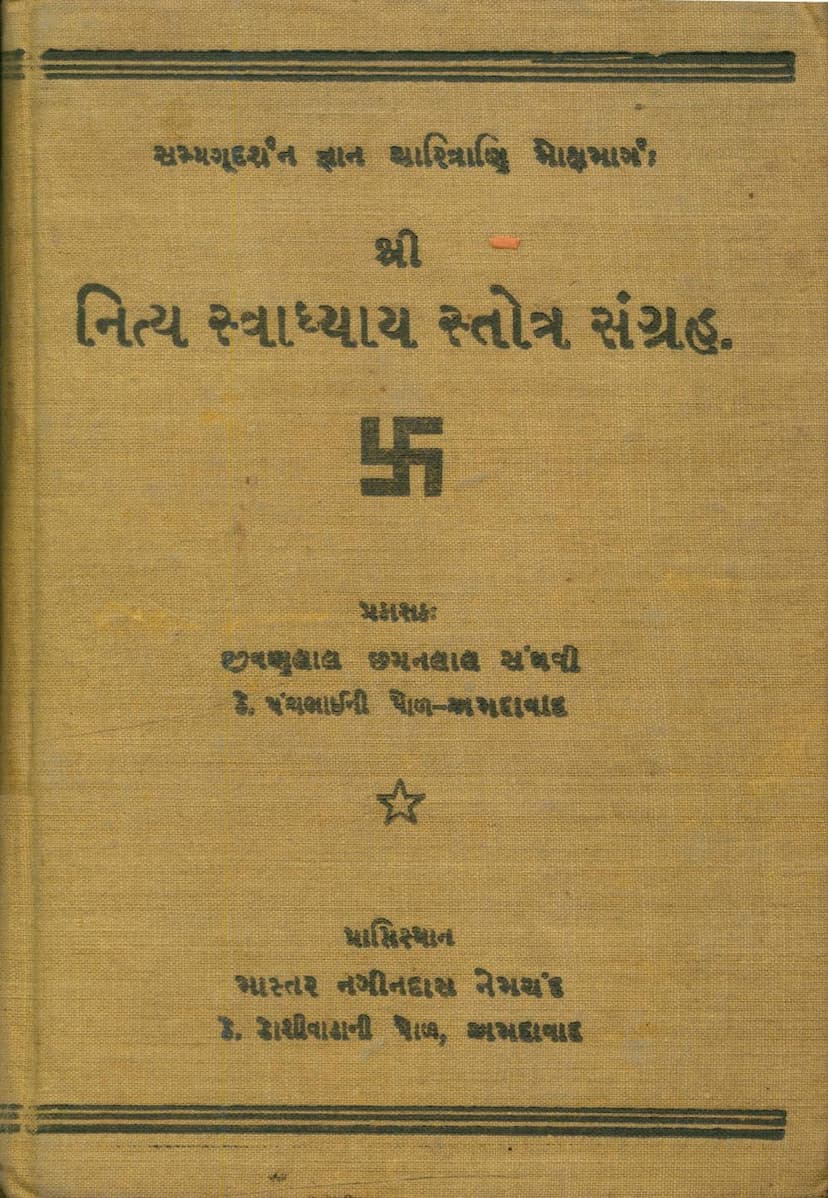Nitya Swadhyay Stotra Sangraha
Added to library: September 2, 2025

Summary
Here's a comprehensive summary of the Jain text "Nitya Swadhyay Stotra Sangraha" based on the provided pages:
Book Title: Nitya Swadhyay Stotra Sangraha (Collection of Daily Chanting Sutras) Author: Jivanlal Chhaganlal Sanghvi Publisher: Jivanlal Chhaganlal Sanghvi Context: This Jain text is a compilation of various devotional and scriptural verses (stotras) intended for daily recitation and study by Jain followers. The collection emphasizes a comprehensive approach to spiritual practice, encompassing mantras, hymns, prayers, and scriptural explanations.
Overall Purpose and Content:
The primary aim of the "Nitya Swadhyay Stotra Sangraha" is to provide a readily accessible resource for Jains to engage in regular spiritual study and devotion. It aims to foster a deeper understanding and connection with Jain philosophy and its key figures and principles. The book covers a wide spectrum of Jain practices, from fundamental prayers to more advanced scriptural texts.
Key Sections and Themes:
The table of contents and the initial pages reveal a highly structured and extensive collection, featuring:
-
Fundamental Prayers and Mantras:
- Navkar Mantra: The foundational mantra of Jainism (Namo Arihantanam, Namo Siddhanam, etc.) is presented prominently, often referred to as the "Atma Raksha Navkar Mantra" and "Namkar Mahamantra," highlighting its protective and spiritual significance.
- Specific Stotras for Protection and Well-being: Several stotras are included for specific purposes, such as:
- Uvasaggaharam Stotra: Chanted to overcome obstacles and afflictions, particularly associated with Bhagwan Parshvanath.
- Shantikar Stotra: Invoking peace and tranquility.
- Tiloyappahayatt Stotra: A hymn that likely praises the illuminating nature of the Tirthankaras.
- Namihun (Nami-un) Stotra: Likely referring to the veneration of Tirthankara Naminath.
- Ajitashanti Stotra: Invoking peace and victory.
- Bhaktaamar Stotra: A highly revered hymn composed by Manatunga Acharya, known for its miraculous efficacy and praise of Tirthankaras.
- Kalyanmandir Stotra: A hymn that promises auspiciousness and well-being.
- Chausaran Payana: A verse of surrender to the Four Sharanas (Rhants, Siddhas, Acharyas, Sadhus).
- Ghatakarna Mahamantra: A powerful mantra for protection.
- Graha Shanti: Hymns for pacifying celestial influences.
- Rishimandal Stotra: A detailed work possibly related to the Rishimandal mantra or worship.
-
Scriptural and Philosophical Texts:
- The collection includes significant Jain scriptures, indicating its comprehensive nature:
- Tattvartha Sutra: The fundamental philosophical text of Jainism, attributed to Umaswami Acharya, explaining the principles of Jainism.
- Dashavaikalika Sutra: A crucial text for understanding the conduct and discipline of monks.
- Kulaka Collections: Several "kulakas" (collections) are listed, suggesting compilations of verses related to specific themes or acharyas, such as:
- Eight Kulaka collections (suggesting a systematic grouping).
- Vairagya Shataka (hundred verses on detachment).
- Siddhar Prakarana (chapters on the liberated souls).
- Abhavy Kulak, Danadi Kulak, Shila Kulak, Tapa Kulak, Bhava Kulak, Gautam Kulak, Punyakulaka – these likely represent classifications of verses related to specific spiritual practices, merits, or disciples.
- The collection includes significant Jain scriptures, indicating its comprehensive nature:
-
Ritualistic and Practical Guidance:
- The book provides practical guidance for daily spiritual activities:
- Sadhusadhvi Aavashyak Kriyana Sutra: Verses related to the essential daily practices of monks and nuns.
- Karemi Bhante, Icchami Thami: Essential verses for confession and seeking forgiveness.
- Devasik Atichar (Minor and Major): Confession of daily faults.
- Ratrika Atichar (Minor and Major): Confession of nightly faults.
- Pakshik Atichar and Pakshik (Parikram) Sutra: Confession of faults over a fortnight.
- Chaitra Vandan Vidhi: Procedure for venerating temples.
- Pachakkhan Vidhi (for breaking fasts): Rituals for concluding vows.
- Gochari Doṣa: Faults to be avoided during alms-rounds.
- Guru Vandana Vidhi: Rituals for venerating spiritual preceptors.
- Pratilekhan Vidhi: Procedures for purifying scriptures and utensils.
- Chulani-Pariśi Vidhi: Rituals related to purifying the alms-bowl.
- Samayika Sutra: Verses for equanimity and meditation.
- Puja Sangraha: Collections of devotional worship.
- Karmagrantha (First and Second): Texts detailing the principles of karma.
- Shala-kalyanukrit: Likely a section related to auspicious rituals.
- Vairagya Shatak: Hundred verses on detachment.
- Siddhar Prakarana: Chapters on liberated souls.
- Samayika: Verses for the practice of equanimity.
- Pachakkhan Vidhi: Procedure for taking and breaking vows.
- Gotama Ashtakam: A hymn in praise of Gautam Swami.
- Punya Prakash Stavan: A hymn celebrating merit.
- The book provides practical guidance for daily spiritual activities:
Compilation and Intention:
The preface indicates that the book was compiled based on an earlier collection ("Nitya Swadhyay Tetradi Sangraha" published by Shravak Amritlal Parshotamdas). The publisher, Jivanlal Chhaganlal Sanghvi, mentions that the inclusion of certain topics was suggested by respected monks and nuns. The motivation for publishing this extensive collection, even in a time of high costs, was the significant demand for such daily spiritual resources, as other published materials were scarce. The publisher expresses hope that the book will be highly beneficial for students and practitioners.
Key Features:
- Vast Scope: The collection covers nearly 4000 verses, indicating its comprehensive nature.
- Practical Application: It includes detailed procedures for various rituals and daily practices.
- Devotional Focus: The emphasis on stotras and mantras highlights the devotional aspect of Jainism.
- Accessibility: The compilation aims to make these important spiritual texts accessible to a wider audience for daily practice.
In essence, the "Nitya Swadhyay Stotra Sangraha" is a monumental work that serves as a spiritual guide for Jain followers, offering a rich collection of prayers, scriptures, and ritualistic instructions to aid in their daily religious life and spiritual growth.